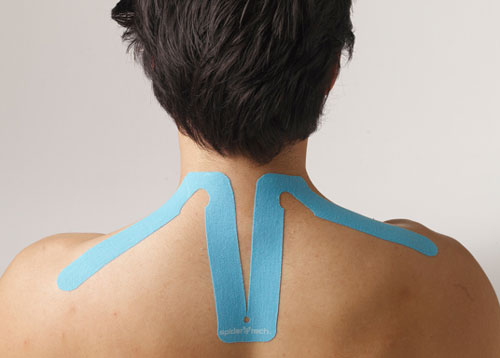
Kinesiology Tape and You!
July 24, 2014; Posted by: WeBleed staff
 We’ve all seen athletes on television wearing that mysterious colored tape on their shoulders, arms, backs, abdomens, and legs…but what is it, what are the benefits, and is it safe for folks with bleeding disorders to use (athlete or not)?
We’ve all seen athletes on television wearing that mysterious colored tape on their shoulders, arms, backs, abdomens, and legs…but what is it, what are the benefits, and is it safe for folks with bleeding disorders to use (athlete or not)?
(pictured at right is Olympic and professional beach volleyball player Kerri Walsh)
Kinesiology Tape, or KT, has been around for more than three decades used by chiropractors, physical therapists, athletic trainers, and massage therapists to reduce pain, improve posture and range of motion, speed injury recovery, and improve performance on the field or court.
The bleeding disorders community is no stranger to KT and has been using it in patients with joint and soft tissue bleeds or injuries. It is also particularly helpful for patients who have undergone joint repair or replacement surgery.
KT works by providing the body with tactile feedback, improving body awareness, without restricting range of motion. The inherent elasticity of the colorful tape produces a vertical lift of skin, decompressing the space between the skin and muscle – improving blood flow, reducing edema, inflammation, and pain.
“With hemophilia patients, it’s tremendously useful because it helps with edema, or swelling, by draining the excess fluid and getting the blood out,” says Cindy Bailey, PT, DPT, OCS, SCS, director of the physical therapy program at the Hemophilia Treatment Center at Orthopaedic Hospital of Los Angeles.
The benefits of KT certainly extend beyond athletics (especially for people with certain bleeding disorders) but you need to know that there are potential dangers, particularly when you are at risk or have a history of Deep Vein Thrombosis (DVT).
The Kinesiology Tape in cases of DVT can cause blood clots to break free and travel to one or more vital organs (heart, lungs, or brain) which is potentially fatal. You should never tape affected body parts.
Other instances when KT should not be used: if you have kidney problems/renal issues, active cancer, infection, or congestive heart failure.
Further reading: The Art & Science of Kinesiology Taping; When Not to Use KT Tape
Image credit: DenverColoradoChiropractic.com; Google Images
webleed.org – your source for bleeding news!



